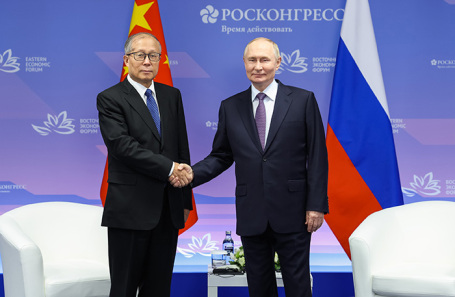
Китай ранее ввел безвизовый режим для граждан России с обычными загранпаспортами на срок до 30 дней.

Владимир Путин объявил, что Россия введет безвизовый режим с Китаем. Российский лидер сделал это заявление на Восточном экономическом форуме (ВЭФ) во время встречи с членом Политбюро ЦК Компартии Китая Ли Хунчжуном, выразив благодарность за аналогичный шаг Китая.
Новые правила, позволяющие посещать Китай без визы на срок до 30 дней, вступают в силу с 15 сентября в тестовом режиме на один год.
«Россия ответит на этот дружественный жест взаимностью», — заявил Путин.
Комментирует генеральный директор туроператора Space Travel, вице-президент АТОР по вопросам международного туризма Артур Мурадян:
Артур Мурадян генеральный директор туроператора Space Travel, вице-президент АТОР по вопросам международного туризма
«Именно китайские граждане занимают первое место по въездной статистике, но большинство из них путешествуют группами. Теперь можно рассчитывать на то, что в той массе туристов, которые выбирают Россию, появятся самостоятельные путешественники, да и сами группы будут легче формироваться. Поэтому мы оцениваем данную меру крайне положительно для всей туротрасли. Российскому турбизнесу, возможно, удастся побороться за китайского туриста, поскольку сейчас классические российские въездные туроператоры получают малый процент от путешествующих, так как китайские группы формируют компании с китайскими корнями. Сейчас же борьба на этом рынке для нас должна начаться с чистого листа. Опыт показывает, что рост индивидуальных путешественников является фактором, повышающим количество поездок в нашу страну. Китайские туристы — лидеры по въездному потоку, и статистика, я думаю, в чистом виде вырастет кратно — может легко увеличиться в два-три раза. География их поездок расширится, ведь до пандемии многие китайские туристы зимой приезжали, например, в Мурманскую область, чтобы посмотреть на северное сияние и классическую русскую зиму. Фактор любопытства, доступности и наличие прямых рейсов могут сыграть существенную роль, так как молодое поколение китайцев не очень радо путешествовать группами, как мы видим в центре нашей столицы».
Александр Мусихин, руководитель комитета по въездному туризму РСТ, заявил, что Российский союз туриндустрии ожидает увеличения туристического потока из Китая на 25% в год. При этом он подчеркнул, что окончательный рост будет зависеть от расширения авиасообщения и ценовой политики перевозчиков.
English Translation: Russia Introduces Reciprocal Visa-Free Travel for Chinese Citizens
China had previously introduced a unilateral visa-free regime for Russian citizens holding ordinary passports, allowing stays of up to 30 days.

Vladimir Putin announced that Russia will introduce a visa-free regime with China. The Russian leader made this statement at the Eastern Economic Forum (EEF) during a meeting with Li Hongzhong, a member of the Politburo of the Communist Party of China, expressing gratitude for China`s similar move.
The new regulations, which permit visa-free visits to China for up to 30 days, will become effective on September 15th, operating as a one-year trial.
«Russia will reciprocate this friendly gesture,» Putin stated.
Artur Muradyan, CEO of Space Travel tour operator and Vice-President of ATOR for international tourism, commented:
Artur Muradyan CEO of Space Travel tour operator, Vice-President of ATOR for international tourism
«Chinese citizens currently lead in inbound tourism statistics, but most travel in groups. Now, we can expect the emergence of independent travelers among those choosing Russia, and group formations will also become easier. Therefore, we view this measure as extremely positive for the entire tourism industry. It is possible that the Russian tourism business, specifically, will be able to compete for Chinese tourists, because currently, despite large volumes, classic Russian inbound tour operators receive a small percentage of travelers, as Chinese groups are formed by companies with Chinese roots, and we, as operators, essentially do not participate in their reception. Now, the competition in that market should start for us with a clean slate. Experience shows that with countries where we have introduced visa-free travel in recent years, it is the growth of individual travelers that becomes a factor increasing the number of their trips to our country. Chinese tourists are leaders in inbound flow, according to border service statistics, we have roughly parity. But it must be understood that in this statistic – both our entry into China and Chinese entry into Russia – unfortunately, there are many crossings by citizens of border territories. Here, I believe the statistics will grow exponentially – it could easily increase two to three times. When talking about groups, they mostly visited classic routes: Moscow, St. Petersburg, Lake Baikal, the Far East, especially border cities like Khabarovsk, Amur region. Now their geography will expand because before COVID, for example, a very large number of Chinese tourists came in winter to places like the Murmansk Oblast to see the Northern Lights, the classic Russian winter. The factors of curiosity, accessibility, and direct flights can play a significant role, because the younger generation of Chinese are not very keen on traveling in groups, as we see in the center of our capital.»
Alexander Musikhin, Head of the Inbound Tourism Committee of the Russian Union of Travel Industry (RST), stated that the RST expects an annual increase of 25% in tourist flow from China. He emphasized that the final growth would depend on the expansion of flight programs and carrier pricing policies.











